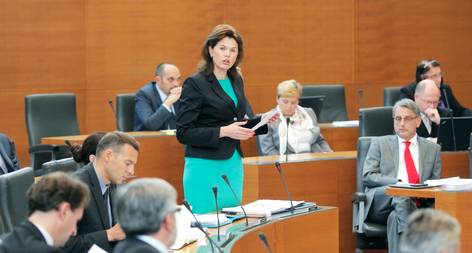NEWS
Prime Minister in her answers to parliamentary questions: "We are the first Slovenian government to seriously tackle the fight against the grey economy"
At today's session of the National Assembly, the Prime Minister of the Republic of Slovenia, Alenka Bratušek, answered questions raised by the deputies. The first was Deputy Jožef Horvat from New Slovenia Party, who asked the Prime Minister how she received the proposals put forth by the Slovenian economic sector and what actual measures the Government would undertake in order to facilitate the recovery of the Slovenian economy. In her reply, the Prime Minister highlighted four main segments from the range of planned measures: firstly, the rehabilitation of Slovenian banking system, which will enable Slovenian banks to provide new loans to the economy and secondly, corporate repayments, since the level of companies' indebtedness in Slovenia is the major problem at this moment. In this area, two laws are being prepared and harmonised with international institutions such as IMF and the European Central Bank; however, the state aid to the companies which have the chance of survival is important as well. The third large package of measures consists of structural reforms, including pension, labour market and health reforms. The Prime Minister also mentioned the revision of public procurement system with the focus on guarantees, boosting the economy and competitiveness, and elimination of administrative and/or bureaucratic barriers, which is also supported by the economic sector and would be upheld by the Government. The Prime Minister emphasised that at the moment, we cannot only be involved with economic growth, but must also focus on fiscal consolidation, adding that all measures would be disclosed during the presentation of the national budget for the next year.
The next parliamentary question was asked by Marko Pogačnik, Deputy of the Slovenian Democratic Party, and concerned the stability of resources for the pension budget. The Prime Minister assured that the Government, by earmarking additional one hundred and forty million EUR from the national budget, provided financial sustainability and stability of the pension budget for this year, and reminded that a gap of one hundred and forty million EUR had been left by the former Government in this area. "If this had not been done, the pensions should have been reduced by 6.6 % in the second half of the current year," stressed the Prime Minister and announced that higher economic growth and new jobs would increase the contributions to the pension budget as well.
To the question posed by Slovenian People's Party Deputy Franc Bogovič about how she evaluated the implementation of the stability programme for 2014, the Prime Minister answered that in addition to the measures already mentioned, there were a few indicators showing the positive effects of the adopted measures. She reminded that the national budget in August showed a surplus, the unemployment rate was reduced by 7.600 people also owing to an active employment policy, and the export rose by 2.3 percent this year. She went on to explain that Slovenia was one of the last European countries to have increased its value added tax and that "real estate tax is the last item from the stability programme for 2013". Concerning the integration of municipalities she reminded the Deputy that the majority of citizens were in favour of this measure as indicated by public opinion pool data.
The last parliamentary question was posed to the Prime Minister by Matjaž Han, Deputy of the Social Democratic Party, and referred to the Government's measures to fight the grey economy. In her reply, the Prime Minister stressed that the present Government is the first Slovenian government to have tackled the grey economy at all. A comprehensive document on dealing with the grey economy in Slovenia has been prepared in cooperation with several ministries and will be supplemented by new measures as appropriate. The measures will regulate the areas of undeclared work, introduction of damages for illegal buildings, enhanced supervision of work referring to agricultural sector, cutting trees and the related trade, supervision in the area of safe and quality food and the campaign which is already in progress, i.e. the "Wake Up" campaign. The Market Inspectorate will continue with its enhanced control of invoicing. The Prime Minister also highlighted the relevance of introducing certified cash registers and increasing the inspectors' powers, emphasising that there is great potential for new fiscal revenues inherent in these measures, therefore they were undertaken with utmost seriousness. Moreover, fight against the grey economy may contribute to faster and easier fiscal consolidation.




